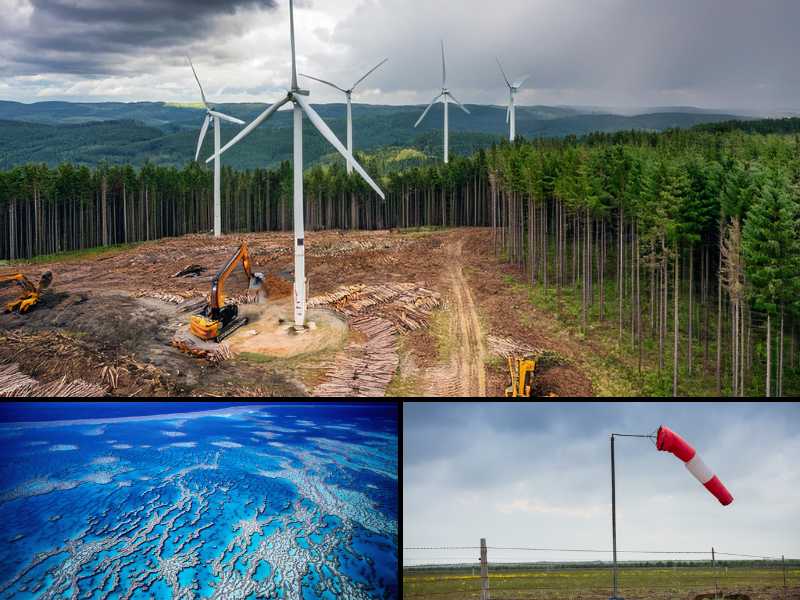|
Heartland Releases Major New Climate Science Report
This week The Heartland Institute released the Nongovernmental Panel on Climate Change’s (NIPCC) seminal publication on climate science, Climate Change Reconsidered II: Physical Science (CCR-II). NIPCC’s report finds there has been little if any warming over the past 16 years and “the Sun may have contributed as much as 66% of the observed twentieth century warming, and perhaps more.” Governments continue to promote public policies aimed at combating man-made catastrophic climate change. Claims of global warming have been used as an impetus for hydraulic fracturing bans, renewable portfolio standards, climate taxes, alternative energy subsidies, and various other burdens on businesses and taxpayers. Based on CCR-II’s findings, these policies are not only harmful to the economy, but they will have little if any impact on climate change. According to NIPCC, “Whereas the reports of the United Nations’ Intergovernmental Panel on Climate Change (IPCC) warn of a dangerous human effect on climate, NIPCC concludes the human effect is likely to be small relative to natural variability, and whatever small warming is likely to occur will produce benefits as well as costs.” The report’s Summary For Policymakers concludes, “Few scientists deny that human activities can have an effect on local climate or that the sum of such local effects could hypothetically rise to the level of an observable global signal. The key questions to be answered, however, are whether the human global signal is large enough to be measured and if it is, does it represent, or is it likely to become, a dangerous change outside the range of natural variability?” On September 23, Heartland will co-sponsor a Washington, DC event with The Heritage Foundation on CCR-II with Dr. Robert Carter, Dr. Willie Soon, and Heartland President Joseph Bast. Among other topics, the panelists will discuss the chronic failure of climate models, the role of climate feedback mechanisms, and the real temperature trends over the past century. This week’s edition of The Leaflet features research and commentary addressing climate change, Internet access tax moratorium, states keeping school spending secret, retroactive taxes in California, mortgage financing, and the Affordable Care Act. Respectfully, John Nothdurft |
|
Climate Change Reconsidered II: Summary for Policy Makers (SPM) Introduction Conclusion NIPCC’s conclusion, drawn from its extensive review of the scientific evidence, is that any human global climate signal is so small as to be embedded within the background variability of the natural climate system and is not dangerous. At the same time, global temperature change is occurring, as it always naturally does. A phase of temperature stasis or cooling has succeeded the mild twentieth century warming. It is certain that similar natural climate changes will continue to occur. In the face of such facts, the most prudent climate policy is to prepare for and adapt to dangerous climate events and changes regardless of their origin. Adaptive planning for future hazardous climate events and change should be tailored to provide responses to the known rates, magnitudes, and risks of natural change. Once in place, these same plans will provide an adequate response to any human-caused change that may or may not emerge. Policymakers should resist pressure from lobby groups to silence scientists who question the authority of the IPCC to claim to speak for “climate science.” Climate Change Reconsidered II: Physical Science reveals a scientific community deeply uncertain about the reliability of the IPCC’s computer models, its postulates, and its interpretation of circumstantial evidence. This criticism doesn’t come from a “fringe” of the climate science community: It is stated plainly and repeated in thousands of articles in the peer-reviewed literature. |
|
New House BIll Would Extend Internet Access Tax Moratorium In this article from Somewhat Reasonable, Matthew Glans discusses the Permanent Internet Tax Freedom Act, a bill introduced by Chairman Goodlatte (R-VA) and Representative Eshoo (D-CA). The proposal is designed to ensure consumers’ access to broadband is protected from onerous local taxes and fees by permanently extending the 1998 Internet Tax Freedom Act (ITFA) ban on state and local taxation of Internet access service. This moratorium, set to expire in 2014, would be made permanent by Goodlatte’s bill. Glans examines the initial reaction to the new House bill, which was positive from several groups. The Internet Tax Freedom Act Coalition, a partnership of businesses, associations, and consumers dedicated to the growth of the Internet economy, commended the bill’s cosponsors. “An increase in Internet access taxes would hit broadband users everywhere for billions of dollars of new government spending, placing an unnecessary burden on consumers in order to do something the market is already handling quite effectively. Making the Internet access tax moratorium permanent would help broadband access and development expand while reducing the need for more government broadband spending.” PODCAST: Jason Bedrick: States Keep School Spending Secret A great many states are slow to report what they spend on K-12 education, and when they do report, they often don’t include everything or make it easy for the public to find, says a new Cato Institute report. Jason Bedrick joins the podcast to discuss school spending, especially the curious polls finding most people think public schools spend half what they really do. It’s impossible for people to monitor what governments do with their money if they don’t know much about it in the first place, Bedrick says.
California Okays Full and Partial Relief from Retroactive Tax In this article from The Heartlander digital magazine Steve Stanek writes about the debate over the retroactive taxation of capital gains in California. This unusual situation emerged when an incentive program that allowed sales of stock of a qualified small business to be taxed at half of the regular state rate was ruled unconstitutional by the Second District Court of Appeal. As a result, the Franchise Tax Board announced it would demand the return of $120 million in incentive payments, with interest, going back as far as 2008. Thousands of Californians were now required to pay a tax they were promised they would not need to pay. The reaction was swift, taxpayers pushed back hard against the tax and two pieces of legislation offering partial or full relief against the tax were sent to Gov. Jerry Brown. “Entrepreneurs and small businesses create the majority of new jobs in California and are the lifeblood of a healthy economy,” businessman Brian Overstreet said. He said the passage of a bill to provide full relief from retroactive taxation “will give business owners more faith in California’s leaders, will create more high income jobs throughout the state, and will bring more investment to new California ventures.” Chicago Tribune Letter: Mortgage Financing This letter to the Chicago Tribune examines the Federal Housing Finance Agency’s efforts to shrink the footprint of Fannie Mae and Freddie Mac. Matthew Glans argues these efforts to improve the role of private companies in mortgage financing are a promising sign. The financial condition of both Freddie and Fannie has continued to deteriorate over the past few years. Years of mismanagement and poor decisions have taken their toll on the beleaguered government-sponsored enterprises, bleeding out billions in losses. Glans points out the so-called profits claimed by Freddie and Fannie supporters are artificially inflated because the companies delayed including billions of dollars in potential losses. “The risk of yet another bailout for Freddie and Fannie always exists as there are few limits on how much Fannie and Freddie are allowed to request from the Treasury Department or how often they’re allowed to go hat-in-hand,” Glans writes. “While ideally Freddie and Fannie should be abolished altogether, loan limits are a good start.” PODCAST: Benjamin Domenech: The Affordable Care Act Research Fellow Benjamin Domenech recently was a guest on Warren Olney’s “To the Point” public radio show on KCRW in Los Angeles. Domenech talked about the Affordable Care Act, preparations for the impending roll out, recent delays in the implementation of certain aspects of the law, and the Washington politics surrounding the law, particularly the effort to de-fund it.
|


